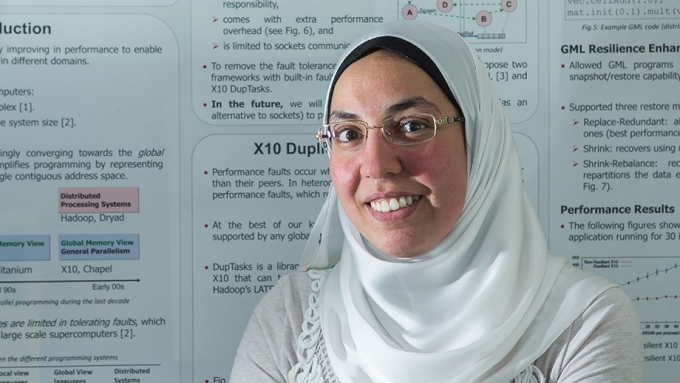Sara, what are you studying at ANU?
My research is about parallel programming languages, which are used to write programs for multi-core systems and supercomputers. Supercomputers provide massive computational power by linking huge number of processors to work together in solving big problems. A failure in one processor during the execution puts the whole computation at a risk of complete crash. My main focus in the PhD is to make parallel programming languages smarter in handling failures automatically without much intervention from programmers.
What is your favourite spot on campus?
The ANU has a very beautiful campus, and there are so many places to select a favourite from, but I think my most favourite in the Hancock library, and in particular, its study zones.
You like it because….
I feel very productive when I study there. When I get bored of my office or when I seek a zero distraction mode to finish some work, I go to Hancock library with my laptop or some papers to read, and I usually come back happy with lots of work done.
If you were free for an afternoon, you would…..
I would be hanging out with friends somewhere around the city. Having to sit in front of the computer for long hours every day, I prefer to enjoy my free time with people rather than machines.
Tell us about your attendance at the IPDPS conference. What was the conference about? What did you take away from it?
The conference covered wide range of topics including advances in computer architecture, programming languages and algorithms. Researchers were also presenting novel methods for handling challenges of running large scale computations including resilience to failures and reducing power consumption.
Participation in IPDPS PhD forum was a great experience. It allowed me to communicate my ideas to senior researchers and other students and get valuable comments and suggestions from them about my work.
The forum also included mentoring sessions about writing and presentation skills, in addition to friendly informal discussions with distinguished scientists from academia and industry about life after a PhD and how to achieve work/life balance in the academic career.
Winning the best poster presentation award was of course the most wonderful part. The conference audience were allowed to vote for the best presentation, and I was lucky enough to win this award.
What was your presentation about?
I presented a paper about a library called the Global Matrix Library (GML) written using a high level parallel programming language called X10. The library is used to implement parallel linear algebra algorithms without requiring users to learn parallel programming.
In the paper, we described how we enhanced GML to be resilient to failures using a common fault tolerance mechanism called checkpoint/restart. Checkpoint/Restart works simply by taking periodic snapshots for the application state, and upon a failure, the application recovers automatically by restarting from the point of the last checkpoint.
Linear algebra is vital in multiple areas of science. We hope GML and its resilience support can help more researchers start utilizing supercomputers to process their large datasets without having to worry about learning parallel programming or fault tolerance.
Can you tell us about your love of computers? Why are you so passionate about them? What advice would you give to students considering enrolling in a course at the College of Engineering and Computer Science?
I love the way computers automate things and bring more convenience to our lives. Great discoveries and inventions in biology, physics, chemistry and other different areas would not be achieved without the efforts of computer scientist to provide optimized algorithms and simulation and analysis tools that move forward the discovery of solutions to our real life problems.
My advice to students who consider taking a computer science course at CECS is try to make programming your best friend; use it as a tool to sharpen your problem solving skills and to deepen your understanding of other theoretical materials you take in other courses.
The field of computer science evolves very quickly, and there will always be new things to learn and to develop, do your best to be updated with the new developments, because what you learn today as the state of the art might not be the same next year.

